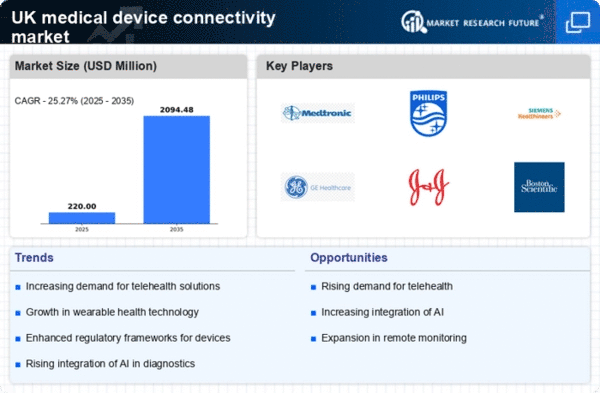Advancements in Wireless Technologies
advancements in wireless technologies are propelling the medical device connectivity market. Innovations such as Bluetooth, Wi-Fi, and cellular networks are enhancing the capabilities of medical devices, enabling them to transmit data efficiently. In the UK, the adoption of wireless technologies is projected to increase by over 30% in the next five years, as healthcare providers seek to improve operational efficiency and patient care. These advancements not only enhance the functionality of medical devices but also support the integration of Internet of Things (IoT) solutions in healthcare, further driving the growth of the medical device-connectivity market.
Growing Demand for Remote Patient Monitoring
there is a notable surge in demand for remote patient monitoring solutions. This trend is driven by the increasing prevalence of chronic diseases in the UK, which necessitates continuous health monitoring. According to recent data, approximately 15 million people in the UK live with chronic conditions, leading to a heightened need for devices that can transmit health data in real-time. The integration of connectivity features in medical devices allows healthcare providers to monitor patients remotely, improving patient outcomes and reducing hospital visits. This shift towards remote monitoring is expected to contribute significantly to the growth of the medical device-connectivity market, as it aligns with the broader trend of enhancing patient care through technology.
Increased Focus on Data Security and Privacy
As the medical device-connectivity market expands, there is a growing emphasis on data security and privacy. With the rise of connected medical devices, concerns regarding the protection of sensitive patient information have intensified. The UK government has implemented stringent regulations to safeguard patient data, which has led to increased investments in cybersecurity measures by medical device manufacturers. It is estimated that the market for healthcare cybersecurity solutions will reach £3 billion by 2026. This focus on data security not only ensures compliance with regulations but also builds trust among patients and healthcare providers, thereby fostering growth in the medical device-connectivity market.
Rising Investment in Healthcare Infrastructure
rising investments in healthcare infrastructure across the UK are benefiting the medical device connectivity market. The government has committed to enhancing healthcare facilities and technology, with an investment of £20 billion earmarked for the NHS over the next five years. This funding is expected to facilitate the adoption of advanced medical devices that require connectivity features. Improved infrastructure not only supports the deployment of connected devices but also enhances the overall efficiency of healthcare delivery. As healthcare facilities upgrade their systems, the demand for medical device connectivity solutions is likely to increase, further propelling the growth of the medical device-connectivity market.
Integration of Artificial Intelligence in Healthcare
The integration of artificial intelligence (AI) in healthcare is emerging as a key driver for the medical device-connectivity market. AI technologies are being utilized to enhance the functionality of medical devices, enabling predictive analytics and personalized treatment plans. In the UK, the AI in healthcare market is expected to grow at a CAGR of 40% over the next five years, indicating a robust interest in leveraging AI for improved patient outcomes. This integration allows for more efficient data analysis and decision-making processes, which are crucial for the effective use of connected medical devices. Consequently, the medical device-connectivity market is likely to benefit from the increasing adoption of AI technologies.
















